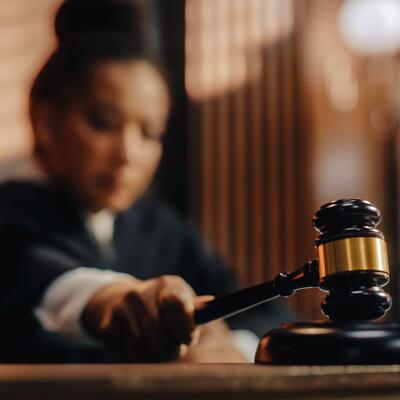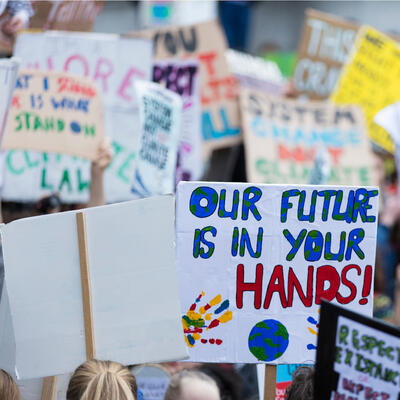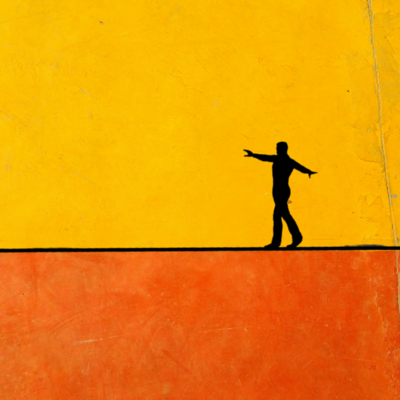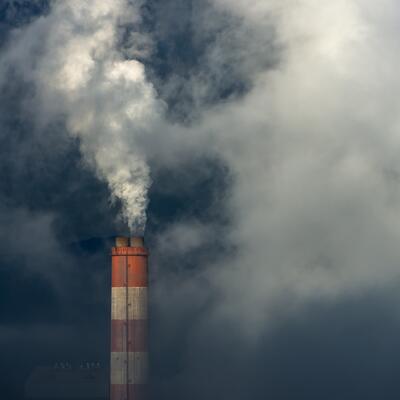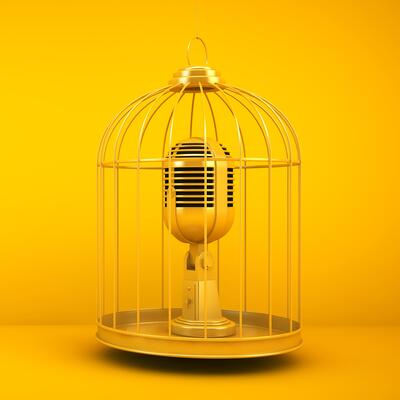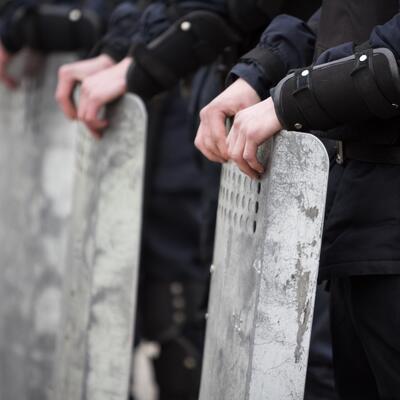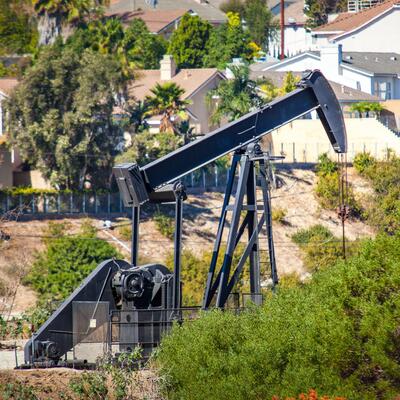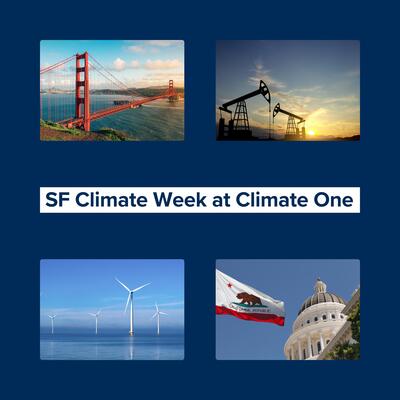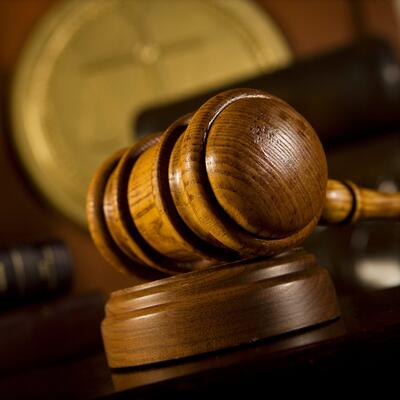
Young People Are Bringing Climate To Court. And Winning.
Guests
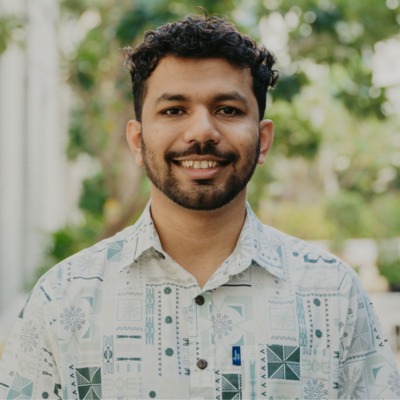
Vishal Prasad
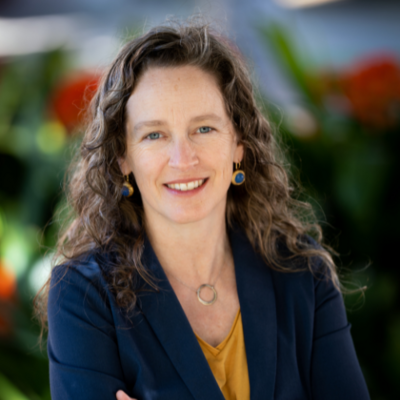
Julia Olson
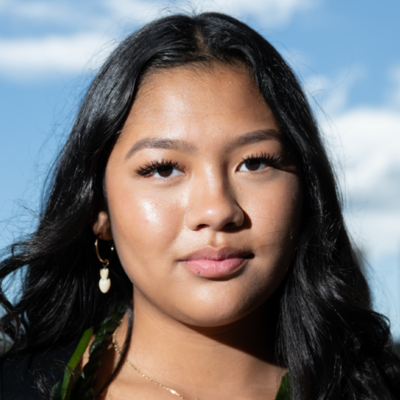
Rylee Brooke Kamahele
Summary
We’re all feeling the effects of the fossil-fueled climate crisis, but young people will not let this threat to their future go unchallenged. They’re taking it to the courts. After big wins in Montana and Hawaiʻi , youth advocates may have had their biggest win in the International Court of Justice.
“ We were very anxious about the opinion because this was the culmination of six years of work on our part,” says Vishal Prasad, director of Pacific Islands Students Fighting Climate Change. This group of students led the charge to take their concerns to the Worlds Court, seeking an advisory opinion. They wanted the court to answer two questions: what are the obligations of states under international law to ensure the protection of the environment, and what are the legal consequences for states under these obligations when they cause harm to the environment?
On July 23rd, the court announced their decision: countries do have a legal obligation to address the climate crisis. If states do not adhere to the decision, the UN says, “they incur legal responsibility and may be required to cease the wrongful conduct, offer guarantees of non-repetition and make full reparation depending on the circumstances.”
“ Everyone was just celebrating in the courtroom as soon as the reading finished,” says Prasad. He says they were shocked that the opinion, “ had really gone beyond many of the things that we had asked and hoped for.”
At the same time, in the United States, the Environmental Protection Agency has announced they intend to rescind the endangerment finding – which was a determination made by the Environmental Protection Agency in 2009. The endangerment finding says that greenhouse gases endanger public health and welfare. This finding created the legal basis for regulating climate pollutants – like emissions from vehicles and other sources. It underpins many federal climate regulations.
Rescinding the endangerment finding is “ is part and parcel of the executive orders directive to the agencies to clear the path for fossil fuels to undo, climate protections,” says Julia Olson, Co-Executive Director and Chief Legal Counsel at Our Children’s Trust - a law firm that brings youth climate cases to court.
Our Children’s Trust represented youth plaintiffs in the case Juliana v. United States - which asserted that the federal government’s actions helped contribute to climate change and violated their constitutional rights to life, liberty and property. That case has been effectively stymied by the Supreme Court. But Our Children’s Trust cases Held v. Montana and Navahine v. Hawaiʻi Department of Transportation were both victories for the youth and the climate. In those cases, the youth plaintiffs used their states’ constitutional right to a clean environment to bring their claims to court.
“ It's scary going into a courtroom and having attorneys against you,” says Rylee Brooke Kamahele, a youth activist and plaintiff in Navahine v. Hawaiʻi Department of Transportation, "but in the end it was worth it. We got the changes we wanted to see.”
A new federal case called Lighthiser v. Trump is being brought by Our Children’s Trust targeting President Trump's declaration of an energy emergency. That case is set for a very important two day evidentiary hearing in federal court in Missoula, Montana, September 16th and 17th.
Episode Highlights
3:57 - Vishal Prasad on his experience hearing the announcement of the ICJ opinion
7:29 - Vishal Prasad on his expectations
10:26 - Vishal Prasad on the real world impact of the ICJ opinion
16:36 - Vishal Prasad on his climate experience
23:48 - Julia Olson on the ICJ opinion
29:31 - Julia Olson on the status of Juliana v. United States
38:53 - Julia Olson on the EPA’s attempt to rescind the endangerment finding
43:28 - Rylee Brooke Kamahele on her homeland
47:17 - Rylee Brooke Kamahele on participating in the lawsuit
57:09 - Rylee Brooke Kamahele on the threat of the climate crisis
Resources From This Episode (5)
Full Transcript
Note: Transcripts are generated using a combination of automated software and human transcribers and may contain errors. Please check the actual audio before quoting it.
Ariana Brocious: I’m Ariana Brocious.
Kousha Navidar: I’m Kousha Navidar.
Ariana Brocious: And this is Climate One.
[music change]
Ariana Brocious: Before we get into this week’s show, there’s a huge piece of climate news we need to talk about. The Environmental Protection Agency announced a big rollback recently that could undermine the whole regulatory basis of government climate action. Here’s agency head Lee Zeldin.
Lee Zeldin: We want to hear from the American public to finalize a regulation that not only proposes to rescind the endangerment finding, but all greenhouse gas emissions that followed on light, medium, and heavy duty vehicles.
Ariana Brocious: That term he used “the endangerment finding” sounds obscure and legalistic. But it’s hugely important.
Kousha Navidar: Yes. And it’s hugely important for everyone listening to understand what it means: The endangerment finding is a determination made by the Environmental Protection Agency in 2009. It says that greenhouse gases endanger public health and welfare. This finding created the legal basis for regulating climate pollutants – like emissions from vehicles and other sources. It underpins SO MANY federal climate regulations.
Ariana Brocious: So Trump’s EPA is undermining the agency’s OWN power by rejecting this finding from 15 years ago. And this could have a HUGE impact on how the government regulates emissions - or doesn’t. Because it’s basically saying it doesn’t have the ability to do so anymore.
Kousha Navidar: Zeldin, the head of the EPA, described this as quote “driving a dagger into the heart of the climate change religion."
Ariana Brocious: Which is itself a problematic statement, because climate change is not a belief system, but rather, a very well-established scientific consensus that’s been borne out by mountains of real-world evidence for decades.
Kousha Navidar: And yet, this isn’t game over. Nearly simultaneously, across the Atlantic, the International Court of Justice – that’s the UN’s highest court – announced a huge decision that could change the legal landscape for climate action globally.
Playback: Court announcement
Kousha Navidar: That case was brought to the international court by youth advocates from the island nation of Vanuatu – a small country in the South Pacific Ocean, east of Australia and west of Fiji. It marks another victory for young people who are taking their climate concerns to the courts.
Ariana Brocious: Right. Young folks have chalked up some big wins in the US as well, in Hawaii and Montana. In those cases the youth plaintiffs were represented by Our Children’s Trust - a law firm that brings youth climate cases to court. We’ll hear from their founder a bit later.
Kousha Navidar: Hawaii and Montana are state-level cases. So before we go there, let’s zoom out and talk about this recent ruling I mentioned by the International Court of Justice. Youth activist Vishal Prasad led the campaign - along with other young people from small island nations - to push the International Court of Justice to make their historic ruling. Here he is giving his closing statement before the court in December of last year.
[Playback]
For young people, the demand for reparations is crucial for justice. We have inherited a planet in decline and face the grim prospect of passing on an even more degraded world to future generations. Equally clear is the demand for immediate cessation. If greenhouse gas emissions are not stopped, we are not just risking our future, we are welcoming its demise.
[End Playback]
Kousha Navidar: Prasad is the Director at Pacific Islands Students Fighting Climate Change. He shared with me what it was like to hear the International Court of Justice ruling announced.
Vishal Prasad: I was in the courtroom on the 23rd of July with a few of my colleagues. We were very anxious about the opinion because this was the culmination of six years of work on our part. It's that 50-50 moment you'd have going into a courtroom. Uh, and so there was a lot of anxiety and people were nervous. But, so that was going in, it was a whole different atmosphere coming out of the courtroom. Because what we got from the ICJ was immensely positive. It was a historic advisory opinion and everyone was just celebrating in the courtroom as soon as the, the reading finished. Colleagues, uh, everyone that was from the Pacific in, in that room, along with others, everyone was overjoyed and, and just some of us couldn't even believe, like in a state of shock to believe what the ICJ had just said because the ICJ had really gone beyond, uh, many of the things that we had asked and hoped for, And so a lot of us were put in a state of shock because we had to do a press conference afterwards. And so we had to calm ourselves down and um, okay.
Kousha Navidar: Be media ready
Vishal Prasad: exactly, exactly. Be media ready and just. This is what's happened. Any questions? And then just contain yourselves and then just be ready to go outside. But it was, yeah, a moment. I, we, we weren't ready for that moment. I, we were prepared very, very cautiously about around the delivery. But this was, uh, this just took it, uh, whole to whole new level.
Kousha Navidar: Yeah. It's funny to think like, oh. We got even more than we expected, which just sounds like you're saying, but then it goes, no, there's still work to do. Like can't pop the champagne quite yet. I wanna dig into that state of shock, like the expectations, I guess is what I'm interested in there. Because you testified before the court in December, so when you gave your testimony, what were your expectations? And I think even more interestingly, what happened that blew your expectations away.
Vishal Prasad: Yeah. Well, I think what we were asking the court was very clear from, from our side as, as a speaker, as a representative, as a young person speaking before the court, we were asking for an opinion that was a climate justice opinion, For example, we brought out the idea that climate change is not just governed by the Paris Agreement. All the obligations of states should arise from a wide, wide variety of sources of law. Um, we also talked about the need for, um, the ICJ to clarify the conduct that is causing significant harm. In this case, we were very, very keen on talking about the idea of fossil fuels and the fossil fuel industry, and then how it is, the largest contributors to the significant harm that, that it that's been caused to the climate. And finally, the discussion around consequences that should arise for states that have failed to meet their obligations. Um, and that there should be cessation of the harmful conduct, and then also the duty to make full reparations. So these were more or less the, the arguments that we were making in December.
Kousha Navidar: And so in your heart, did you, did you feel like when you were asking for, were you like, I'm sure you thought partially these are the necessary things that we need, we're not asking for enough, probably. But in in your heart, were you optimistic? Were you thinking, if we get one of these three, that'll be a big win. Talk to me about your expectations in that sense.
Vishal Prasad: Yeah. I mean. We, I dunno. I think for, for all of us that were working on these on the, during the oral hearings, we were very hopeful that we would get all of these three things. But then what was standing in the way was what were the arguments made by countries on the other side? So there were countries that were making arguments that were saying, uh, um, human rights law should not be relevant to this, and it should just be a narrow reading of the Paris Agreement. Or it's difficult to determine causation, et cetera, to understand reparations and, and all of these arguments. And so there were arguments being made on either side, But what was interesting during the reading of the opinion was the ICJ gave all of these elements that we talked about and more in, in, in, in a very strong, uh, robust, positive manner. That was something that was completely unexpected on our part. Um, we, we did mention that at our press conference. We were in that state of shock that we were, okay, this is gone beyond what we've asked for. And I think if you look at the opinion, it. It's so historic. It's a landmark opinion in so many ways, from the main opinion to the separate opinions of the judges, um, and the fact that it was unanimous. And that's very rare.
Kousha Navidar: You also mentioned that you had so many, uh, colleagues and also representatives from other Pacific States in the room with you, right? What did it mean to have that kind of support in the room?
Vishal Prasad: Well, it's so important for all of us to do this, not just as governments, not just as officials, but as people of the Pacific. And so we tried our best to get the lived experiences of people on the ground that were suffering the most from climate change, for their voices to be heard. And so it was a big deal, a huge moment for us to have all Pacific governments because I think the strength of the arguments that were, that were made by Pacific governments, how we showed up in our colors, in our culture, bringing our indigenous voices and language to the court, played a part in the, the final opinion that we got. We didn't have it, all of them come back for the reading because there was a very short notice. But those that were there were all in joy. Some tears of joy as well. Very emotional moment, uh, recognizing what the Pacific has achieved in conjunction with many of our colleagues from around the world and everyone, everyone calls it a, a, a huge win for all of us, especially the small island states that have been out at, at the heart of this.
Kousha Navidar: And you know, I hear so much like joy and um, a little bit of surprise and delight I guess in your recounting of it. And at the same time when I read through it, at least a big point, uh, that has stuck out to me is that rulings from the International Court of Justice are not legally binding. So for you, what impact do you think this rule ruling would have, like realistically?
Vishal Prasad: Well, it's a common line that goes out that the I CJ's opinion is not legally binding. Um, and to just, uh, take a step back and understand that is that, um, these are advisory proceedings of the ICJ. Um, and in the traditional sense there are, these are not legally binding because there are no parties to a case here. There's no complainant, there's no two countries coming to the ICJ, this is. For everyone. The law that the ICJ has clarified and if you read the opinion, it talks about law, international law that already exists. Those pieces of law are legally binding. So when you talk about the Paris Agreement, customer, international law, and all of the laws, the pieces of law that the ICJ has clarified, it has interpreted those laws. So while the opinion may not be legally binding in itself, but the law that is clarifying. Is legally binding. And so what we hope to see coming out of this advisory opinion is a number of things. Negotiations is a big one because the ICJ made huge, uh, huge pronouncements on the Paris agreement, um, the U-N-F-C-C-C and the COP processes and the obligations of states that are party to these conventions. It's going to be huge in, in moving negotiations forward, The second is the idea of litigation. I think, prior to this case, there was a lot of, and there still are, I think 3000 or so, climate cases around the world, and this advisory print provides a huge boost to all of these cases with the findings of the ICJ now confirming the, the, the severity of climate change, but also the need for action, and that it strengthens liability question once and for all. It's not, it's not every, it's not. The magic bullet's going to solve the climate crisis, but it's an enabler that allows us to now have the necessary tools in courtrooms, in negotiation rooms, in different policy spaces to now advocate for stronger action, ambition, and accountability from, from, uh, from governments, from those who hold power. And I think the third is that for campaigns around the world. Everyone that's working on fossil fuels to loss and damage to, um, to, to, uh, climate justice, et cetera, where whichever field of climate campaigns we are working on, I think this advisory opinion has a part as a role in strengthening our campaigns, in demanding, as I said, climate justice at various levels, be it at your national level or your regional level or international level.
Kousha Navidar: Yeah, I, I hear you talking about negotiations, you're talking about litigation, you're talking about strengthening campaigns globally, which makes sense inside and outside of the courtroom. You're saying this could have and likely will have major impacts. You are in many ways living at the center of a lot of this, and I I'm wondering for you, for your conception of climate change, there's this term that we often use to talk about it. We talk about it like an existential threat, right? For you, what does that mean?
Vishal Prasad: Yeah. Well, I think, uh, in living in the Pacific and living in Fiji, um, I'm, I've been fortunate to live in the, in the more urban part of Fiji. Um, and, uh, I grappled with the existential nature of the climate crisis. When I visited one of the villages in Fiji, uh, one of the first villages that was relocated because of climate change. It's, it's called the Uni lawa Village. And I firsthand visited the old village site as a coastal village when I visited with the village chief. Um, and he took us through the old site and explained to us where his home used to be, which is just a pile of posts standing in the middle of the, of the ocean currently. And he explains, that's my, that's where my home was. That's where I used to. I was born, I grew up, my grandparents were there. Um, this is where our farmland was. This is where we, uh, planted, uh, food. Uh, all our food came in from there. Now it's just, um, uh, swamp land because the water keeps coming in. Our water sources are now inundated with salt water, and homes are there that are, that used to be, um, community gathering spaces or people's homes for generations. They're just standing idle there as if it's like a, uh, a scene from a horror movie. Um, and to realize that they, they said that, uh, we've tried everything. We tried to build sea walls. We tried twice to build sea walls, but we could not, um, do that. Um, and then he takes us and he shows us that these are the ancestral burial grounds for our village. All our ancestors are buried in this village because, everyone in Pacific culture and the burial sites are so sacred that they are ancestors and people that parson are buried within the village. And now these are being inundated by the waters. Every time there's a high tide. For many people in the Pacific, your connection to your land is so much more. Um, and your ability to stay in the place, it's called the nure. The concept of nure. And when you're asked to. move away from your, from your community, um, that means everything because you lose your connection to your land. You lose your connection to your culture, your traditions, your roots, you've lost your identity, and that's exactly what, what's happened to these people. There have been other cases where people, um, the whole islands that are com set to be lost because of climate change. You talk about pe uh, the. The reality in, in the Marshall Islands, in, in Tuvalu and in Kiribas where people are, uh, these are atoll islands largely. Um, and every time there's a king tide, water almo comes from almost one end of the island to the other. And so projections are that as if a rise in sea level continues. Many of these islands will become inundated and people will have to move away from these places. Um, all. As, as we say, uh, face the existential threat. You can't survive, you can't live on this. You are, you are, it, it becomes in inhabitable completely.
Kousha Navidar: What was the first moment that you remember encountering climate changes impacting your personal life?
Vishal Prasad: Well, I think one of the most severe moments, for myself was when Tropical Cyclone Winston hit Fiji. Um, this was the strongest cyclone to hit Fiji. It was a category five storm. Um, and
Kousha Navidar: How old were you?
Vishal Prasad: This was back in 2016, so about 18 or 19. And this was one of the first, one of the most severe impacts of climate change. I mean, we had seen cyclones, we'd seen floods before, and this, they used to be, um, they had somehow become a normal part because of how many we had seen in the past. And we knew November to April there'd be cyclones. There'd be a cyclone season. And so you'd prepare for a cyclone at least. But this was the first cyclone I had witnessed, which was so strong and severe. Some of our family members lost our homes, et cetera. And so it was this very, very unreal moment to, to grapple with all of this. That what's happened within just a matter of, hours, um, and what's been lost. And then you see the pictures about people like the whole islands. There's a whole island and villages on that island completely flattened, everything lost. And then you start to understand, okay, they've been, there are people who have, who've had it worse than us in this, in the last 72 hours. And now we face the, the, the challenge of trying to rebuild. Um, and then it's this whole very, very sad discussion about, uh, relocating. Do, how do we rebuild? Do we move away from this place? Or what do we save? What do we lost? Who's gonna pay for this? Where's the money coming from? And so it's, we, we, we know the impact of the cyclones. On that moment when it comes and hits. But the aftermath, when we talk about what's happening afterwards, it's not often talked about, but it's the human toll that that's when it becomes the most severe.
Kousha Navidar: I, I appreciate you sharing that part of your history and your story, and you're, you're right. I mean, it, it strikes me when you talk about the resilience that's required, but also. Talk about the perspective that you are confronted with as well about in the past 72 hours, there are other people who have it even worse. And I, I thank you for sharing that. I'm, I'm reflecting on it right now, and a thing that comes into my mind is that 10 years later, we've got this decision, and you spent six years of your life on that. And so quick math in my head, it's about a fifth of your life that you've spent.
Vishal Prasad: Yeah.
Kousha Navidar: I hear you chuckling. Why are you chuckling?
Vishal Prasad: Uh, it is, it is. Wow. I've not had it put that way, but yeah, it's a significant part of my life actually working on this campaign. It just reminded me of a few things.
Kousha Navidar: What’s it remind you of?
Vishal Prasad: No, it's just, um, how, how far this, this journey has come and how much of it, how, how long we've been working on this and, uh, I think climate change has, gosh, being what, 29 years old in six years, um, of, of my life actually more of it. We've been talking about climate change since university, and then this was one moment for us to kind of do something about it.
Kousha Navidar: You know, the UN Climate Conference is gonna be held in Brazil this year. Uh, what do you see as your role as a voice for Pacific Islanders?
Vishal Prasad: First and foremost, take the advisory opinion into COP 30. This would be the first climate conference, um, that we'll be heading into with the clarification of the ICJ. and we're very keen on seeing how can we ensure this advisory opinion has an impact in unlocking some of these deadlocks and move some of these, these areas of work to much quickly towards a great ambition and accountability that's now needed. the discussions around, uh, climate finance are going to be quite specific, uh, quite interesting for us because the ICJ and then with the opinion going into how does this strengthen or push the discussions on finance and loss and damage forward. The ICJ, uh, very, very firmly said that the temperature goals are no longer two degrees, uh, and the primary temperature target now is 1.5. That's huge for the climate spaces. And how does that materialize into action? Is, is something we going to be looking at and pushing forward? and to see how, um, how we can utilize the advisory opinion to push for a phase out of fossil fuels and ramp up mitigation targets around the world.
Kousha Navidar: Here in the US courts have also recently ruled in favor of youth plaintiffs demanding climate action in Montana and Hawaii. And at the same time, emissions are still going up globally. I mean, the planet is still warming, sea levels are still rising. SoAs you look toward the future right now, how are you feeling?
Vishal Prasad: If you had asked me that question before the advisory opinion, I would say cautiously optimistic. We're being resilient, we're fighting. Um, but now with this advisory opinion, um, we're very hopeful that there is a chance for us to really move the needle on climate action. Finally, international law is with us standing with people that are asking and demanding for stronger climate action now. And so that gives me hope. that gives me the ability to carry on the fight. I believe it will be the same for many others who've been carrying this burden, carrying this fight for so long that the advisory opinion now provides them the necessary tools and the necessary hope to carry on because there's light at the end of the tunnel now.
Kousha Navidar: Vishal Prasad is director of Pacific Island Students Fighting Climate Change. Vishal, it's been a pleasure to talk to you. Thanks for taking the time.
Vishal Prasad: No problem. Thank you so much for having me.
Kousha Navidar: Coming up, what the International Court of Justice decision means for climate cases in the US.
Julia Olson: Our cases are not about money. They're about stopping government conduct that the International Court of Justice has just said is illegal.
Kousha Navidar: That’s up next, when Climate One continues.
Ariana Brocious:Help others find our show by leaving us a review or rating. Thanks for your support!
Kousha Navidar: This is Climate One. I’m Kousha Navidar.
Ariana Brocious: And I’m Ariana Brocious
Kousha Navidar: The decision by the International Court of Justice – that countries have a legal obligation to address the climate crisis – is a huge deal. This gives every court in the world legal bedrock to stand on when hearing cases involving climate.
Ariana Brocious: Years before that case appeared before the ICJ, young people in the US had been bringing climate lawsuits. Probably the most well-known was Juliana v. United States, one of the first cases where youth advocates presented the idea that the government has a responsibility to address climate change.
Kousha Navidar: Then, in Montana and Hawaii, young plaintiffs used their states’ constitutional right to a clean environment to bring their claims to court. And both those cases were victories for the youth and the climate.
[music change]
Ariana Brocious: In all three of those cases, the plaintiffs were represented by Our Children’s Trust - a law firm that argues on behalf of youth advocates – for free.
Kousha Navidar: And in light of the historic ruling by the International Court of Justice, Greg Dalton spoke with the founder of Our Children’s Trust, Julia Olson.
Greg Dalton: So the ICJ in a case brought by Vanuatu, decided countries do have a legal obligation to protect the planet, something you've been working on for decades. How'd you feel when you saw that ruling?
Julia Olson: We were elated. It is so exciting and such a vindication of the work that young people have been doing across the world for over a decade and. Well, the nation state of Vanuatu brought this to the International Court of Justice. It was really the mobilization of youth, many from island nations, youth of Vanuatu and youth in other countries as well. And a lot of indigenous youth who really pushed the country to bring this to the court since only countries can. One of my favorite parts of the court's decision is where it says, the environment is the foundation for human life upon which the health and wellbeing of both present and future generations depend. And the court considers that the protection of the environment is a precondition for the enjoyment of human rights, which has really been at the heart of Our Children's Trust work as you know, Greg, since 2010.
Greg Dalton: Right. So what did the court actually decide? That healthy environment is vital for young people to thrive and have life, liberty, and pursuit of happiness.
Julia Olson: Yeah, just to break down the opinion, uh, there are three really core components. The first is that the court found that climate harm, that countries causing climate change through greenhouse gas emissions, which are heating the planet, that that is a wrongful act under international law. And as a component of that, the court said that every country has a duty to cease emitting the pollution that is causing the planet to heat, and that's causing all of these harms to people, including young people. And then the court also found that current levels of heating, including this 1.5 degrees Celsius target that we've heard a lot of talk about from the Paris Agreement, that that's not safe for protecting human rights, that current levels of heating are already dangerous and already causing violations of human rights. And then the court really validated what the court in Montana, in the Held v Montana case that our Children's Trust litigated, what that court found based on the scientific evidence, which is every amount of greenhouse gas emissions that we continue to put in the atmosphere and every additional increment of heat that that causes, matters and is a violation of law right now because of the state of the climate that we're experiencing. And then I think the other piece, the court really ties the protection of the climate system and states harming the climate system to human rights, including the right to life, the right to health, the right to family, the right to privacy and livelihoods and you know, cultural practices, all of that.
Greg Dalton: So this sounds like a big win. You know, fossil fuels are, are harming, there's a duty of care. Uh, current levels are not safe, whether it's 1.5 degrees of post-industrial warming. Uh, and every bit matters. Uh, though these might be a big moral victory. Uh, international laws based on norms not really binding. So where's the teeth in this other than maybe a moral victory?
Julia Olson: Yeah, well, the teeth in it is really, for me right now, it's at the domestic level of holding governments to these standards. So the international courts from the European Court of Human Rights to the International Court of Justice, to the Inter-American Court of Human Rights, they've all now spoken with pretty unified voices that there are enormous human rights and other rights violations happening right now, and that governments are causing it by continuing to perpetuate a fossil fuel energy system. And so while those precedents may not be binding against every country, and while every country may not respect those courts determinations, they are certainly persuasive to judges in domestic courts around the world, and we're seeing more and more courts really embrace these types of findings. And we're seeing it even right here in the United States with the judges in the state of Montana in the Held case. We're seeing it from courts in the state of Hawaii in our Children's Trust Navahine case, And really one of the first times we saw it, Greg was in 2016 from US District Court Judge Ann Aiken in the Juliana versus United States litigation, where she was one of the first judges in the world to say that the right to a climate system that sustains human life is fundamental to a free and ordered society.
Greg Dalton: Right. So let's pick up on Juliana, 'cause that was one of the first, uh, sort of youth suing their government saying, you're not protecting our future. Uh, though you did get ju Judge Aiken to agree, uh, the US Supreme Court recently, declined to to, uh, to hear that. So isn't, is Juliana kind of over dead for now?
Julia Olson: Well, no, the short answer is no. Um, so one thing for listeners to understand about Juliana is we asked the Supreme Court to reverse a really egregious mistake by the Ninth Circuit Court of Appeals when the court told the plaintiffs that they didn't have standing because the court didn't have a role to play on these matters. Right?
Greg Dalton: They basically said, look, this is a political thing. Congress should solve this. This is not for courts.
Julia Olson: Right. We, we're not gonna do this. You don't have standing. And the analysis they used to get there was just fundamentally flawed. And since then, the US Supreme Court has issued two decisions on this question of standing and other cases, that if Juliana were brought again today, the Ninth Circuit could never get to the decision it got to because the Supreme Court has said that even if there's a small change that happens from a court's decision, even if the plaintiffs have one more dollar in wealth, or one small fraction of harm is addressed, that's enough. And so the new cases are really clear: Plaintiffs would have standing today,
Greg Dalton: So you actually see some, some, some silver lining in some of these cases that have been decided, by the recent Roberts Court that's been sort of flexing and expanding the power of courts. You, that's, that's been concerning in some areas and you think you see some, some avenue for, um, for progress on Juliana, which is this case 21 young people saying, you know, the government's not fulfilling their duty to protect life, liberty, and property.
Julia Olson: That's right. So there's more coming on Juliana. But meanwhile, there's been a lot that's happened since January 20th, uh, with the new administration and, uh, a group of 22 young people have filed a new federal case called Lighthiser v Trump, and that case is set for a very important two day evidentiary hearing in federal court in Missoula, Montana, September 16th and 17th.
Greg Dalton: Right. And that, that one is targeting President Trump's declaration of an energy emergency. He's declared a lot of emergencies to enhance executive powers. Uh, it's a little hard to believe how, why there's an energy emergency when the US is producing more oil than ever before and the world's largest producer. Um, so this is a new tact. This is not Juliana, this is not saying the Constitution is being violated. You're not protecting young people. Uh, what is Lighthizer saying?
Julia Olson: So Juliana was really about four decades of government conduct and creating the energy system we have today. Lighthiser is about three executive orders that President Trump has issued. And you're right, one is on the declaration of an energy emergency, which is false. The other two are about unleashing fossil fuel energy in the United States and revitalizing the coal industry, which has been on its way out the door. And what we're arguing is that those three executive orders, which do three core things, the first thing those executive orders do is they require all of the executive branch to clear the path for fossil fuel energy to be the primary source of energy in the United States. Number two, they block the transition to clean renewable energy and specifically wind and solar, which are the cheapest forms of energy today and the most, uh, readily abundant. And they also block electric vehicles. And the third thing these executive orders do in carrying out the playbook of the Heritage Foundation's Project 2025, is they are taking down and dismantling climate science and the foundation of all of the regulations that we have that really limit pollution and try to transition us off of fossil fuels. So they are trying to take down the entire infrastructure that supports controlling pollution and preventing the kind of harm at stake. So the case is saying a few things. One, those executive orders are violating the right to life of these young people and their right to their liberties, which are written in the Constitution. It also says that by exceeding the power that a president has, President Trump is acting what's called ultra virus, acting outside of what the Constitution says that he can do. And the reason we're arguing that is there are lots of laws that Congress has passed that mandate things like the National Climate Assessment, that mandate the EPA control and limit pollution, not expand it, and there are laws that require the federal government to conduct climate science and research and to make it publicly available, including the warning systems that people depend upon for their safety. And so all of those actions that the Trump administration is taking are fundamentally unconstitutional. And we've asked the court in Missoula, Montana to issue a preliminary injunction to pause all of that activity and really take us back to January 19th.
Greg Dalton: And that gets into the whole question, whether one court can issue a universal injunction that applies, uh, nationwide? This administration, I think. You know, uh, that's, that's very much of a hot button issue right now, those injunctions.
Julia Olson: And let's, and Greg, let's talk about that for just a minute because I wanna make sure there, there are probably a lot of lawyers and maybe even some judges listening to this conversation. And we aren't seeking a universal injunction, which is something the Supreme Court has said that only it can issue in most circumstances. We're asking for traditional injunctive relief, so all we're asking for is an injunction that is necessary to protect the plaintiffs in the case. We're not looking to protect everybody around the country. We're focused on protecting the plaintiffs and because fossil fuel pollution goes up into the air and mixes and then heats the planet. We need to address all of that new pollution in order to protect the 22 plaintiffs before the court.
Greg Dalton: So we may geek out a little bit. I took what, a couple of classes on international law and others in grad school. Uh, but the, uh, the, the question that that raises is the pathway that was left open, uh, by the Supreme Court, uh, was for class actions, have you considered filing class action lawsuits because so many people in flooded towns, burned out, uh, uh, places like, uh, Palisades, et cetera are harmed by climate impacts. Why aren't we seeing class action climate suits?
Julia Olson: Yeah. You know, I mean, class actions are often used when people are seeking monetary remedies. That's a pretty classic use of a class action. Our cases are not about money. They're about stopping government conduct that the International Court of Justice has just said is illegal. I mean, under international law it's illegal. So we're trying to stop that conduct and we don't need an entire class to be certified to do that when we have plaintiffs whose lives are endangered, um, just like from heat. So one example, Greg is one of our clients, he actually was hospitalized with heat stroke and intubated and almost died at one point, and every additional increment of heat, every additional increment of pollution to his air, threatens his life. He's an asthmatic. He's sensitive to heat. It's actually physically harming him. And the question before the court is, can the United States government continue to unnecessarily and intentionally push a fossil fuel industry complex for profit that is unnecessary, that is more expensive than wind and solar is, when there's no energy emergency as you said, like can they legally do that under the US Constitution and threaten young people's lives? I think the answer is no, and that's the question the court is going to have to answer.
Greg Dalton: And I realize you are litigating, your focus is on protecting young people, because they will suffer climate consequences the longest, longer than you or I, yet there's so much happening. In fact the EPA has announced that they intend to repeal the endangerment finding, which is the bedrock for most climate action. Certainly through the EPA, there was a finding by the Roberts Supreme Court that CO2 is a pollutant that can be regulated under the Clean Air Act. That seems that's gonna be revoked. Surely, that will be challenged by environmentalists, perhaps not you, up to the Supreme Court. How concerned are you about that?
Julia Olson: Yeah, that action by the EPA and that administrator Zeldin to undo the endangerment finding is part and parcel of the executive orders directives to the agencies to clear the path for fossil fuels to undo climate protections. And the administration has been very clear about this, that they are implementing all of these efforts in order to carry out the executive orders of the president to unleash fossil fuels. That's the only reason they're doing it because they know that the endangerment finding is a foundational piece of EPA’s ability to regulate and control the sources of those pollutants. So we're asking the court to actually not wait until EPA undoes all of these regulations and undoes the endangerment finding. We're arguing under the Constitution, not the Clean Air Act. that EPA can't do these actions. It's unconstitutional for EPA to be turned into a fossil fuel promoting agency, when its statutory mandate is to control pollution for the health and welfare of Americans.
Greg Dalton: And whereas you look at the Supreme Court and there some textualists, originalists, et cetera, you obviously have a couple of votes you need to, to, to flip. Uh, do you think about individuals and tailoring these arguments and based on what, justice Kavanaugh, uh, justice Coney Barrett, et cetera, might, might flip 'em?
Julia Olson: We do, and I think, Greg, you and I have talked about this since maybe the first time was 2011, and you know, from the beginning of Our Children's Trusts efforts, we were founded in 2010. We have been looking at how do you appeal to people from all different kinds of ideologies across the political spectrum. How do we speak to people in ways in which resonate based on their interpretation of the law? And so we have always developed cases through that originalist and textual lens so that we can speak to justices that care about originalism, but we can also speak to justices that see the Constitution as a living document. And we're in the fortunate position as lawyers, we're litigating cases based on the right to life, and life is written explicitly in the Constitution. And we have evidence from the founding era of ways in which the framers of the Constitution interpreted life. And what they felt life meant was not just about being free from death, but being able to live out your existence and walk the earth in the pursuit of happiness and with your health and your longevity and your natural lifespan, and to not have a government use its power in ways that will harm you, your family, your safety, your security, and ultimately shorten your life.
Greg Dalton: Well, Julia Olson, thanks for sharing your time and we will check in with you, um, down the road on all these cases.
Julia Olson: I look forward to it. Thanks, Greg.
Ariana Brocious: This is Climate One. Coming up, can you imagine going into a courtroom to defend your right to a clean environment - as a teenager?
Rylee Brooke Kamahele: It's scary going into a courtroom and having attorneys against you. But it just made it such a better experience because we knew we had that support.
Ariana Brocious: That’s up next, when Climate One continues.
This is Climate One. I’m Ariana Brocious.
In 2022, fourteen youth advocates filed a lawsuit against the Hawaii Department of Transportation to defend their constitutional right to a clean environment and spark change. In their view, government agencies were moving too slowly to achieve the net zero target set by the state legislature. The case was eventually settled out of court and was another big win for Our Children’s Trust.
Rylee Brooke Kamahele is a climate advocate and was one of the youth plaintiffs in the lawsuit against the Hawaii Department of Transportation. She started working as an environmental activist when she was ten.
Rylee Brooke Kamahele: I live on Oahu and I live in the very center of the island. So I am basically like 20 to 30 minutes away from the beach at all times to 20 to 30 minutes away from like a hiking trail. My mom loved the water. So I grew up there and then my dad was a mountain person and so I was always out hiking outdoors with him. When I was younger, the beach was like a staple in everything we do. If we ever had spare time, we had an early day from school, that's where we would go. And then even hiking. I would, I hiked with like a broken foot. Like it was very important to me to do those kind of things. I started diving at a really young age. And then as I got older that free diving looking snorkeling kind of turned into shark diving. And so I started doing cage-free shark diving.
Ariana Brocious: What is shark diving? That just sounds, for someone who doesn’t know?
Rylee Brooke Kamahele: it is just diving with sharks. so there's some places that'll do it in a cage, but I did cage free shark diving, which just means that you're out in the open water sharks all around you and it's good. I got to swim with like a 14 foot tiger shark. I've had some great experiences in the ocean with that, but I feel like when I was younger I saw a lot more like sea life swimming around with us. You could see the coral kind of just like degenerate and die. And so plastic pollution was kind of my start and my in to activating for climate change.
Ariana Brocious: Yeah. Well, let's talk a bit about some of your activism. 'cause you've been civically engaged since you were quite young. What initially motivated you to take action in your home community? You mentioned plastic pollution. Like what, what sort of things were motivating to you?
Rylee Brooke Kamahele: I went to the beach one day with my mom and I saw a native Hawaiian sea turtle, like entangled in fishing wire and just plastic. And I freaked out. I was probably like five or six, and I was panicking. My mom of course helped me out. She called all the right people. The turtle was fine. But then that kind of led me into like a rabbit hole of why was this in the ocean? Why did people put that in the ocean for animals to get tangled in? Like, that's messed up. And then I would do this really funny thing when I was younger where I would sign us up for beach cleanups and then put it in the calendar and then I'd wake her up on the day of the beach cleanup and be like, mom, I signed us up for beach cleanup at seven in the morning. We need to go to the other side of the island.
Ariana Brocious: I bet she loved that.
Rylee Brooke Kamahele: It was such a great surprise. And then from there I met a lot more activists, I started speaking on bills. My parents like to tell everyone that I was like raised in the capitol and our city council, Honolulu holiday is what we call it. because I was just there so often. I spoke on bills against citations in captivity, sunscreen ban. I was a part of the plastic phaseout bill in Hawaii. I was a part of that since I was 10 years old to – it took a really long time to get passed. There were a whole bunch of youth on that board and I was like the youngest kid that was involved. And so I got to grow up with those slightly older than me youth activists and kind of just follow in their footsteps. Um. I eventually wrote my own bill and put it in at both the state and the city, county.
Ariana Brocious: You were one of 13 plaintiffs in the case Navahine versus Hawaii Department of Transportation, which was filed in June of 2022. You and your fellow youth plaintiffs argued the state violated your constitutional rights by pursuing fossil fuel based transportation policies and that those contributed to greenhouse gas emissions. As a plaintiff, what evidence did you give to demonstrate how these state level decisions affected your quality of life?
Rylee Brooke Kamahele: So some of the personal effects that I talked about in my statement was my food, and like staples and things that I eat, like poi being affected because of drought and just the plants not growing correctly. My Dad, like I said, is a big mountain person. We have a bunch of native plants that grow at our house that we eat also, and drought and just the crazy changes in weather really affected us that way and the food that we grow for ourselves and our animals. Aside from that. I talked about anxiety for my future kids and the kids that I work with and how are their futures gonna look. So really fighting for that next generation. I talked about being able to firsthand see the decrease in sea life and in the coral and just fish populations. And kind of seeing my islands, like my home that I grew up in, that I wanna raise a family in degenerate right in front of me. In 2021, so when we first started the lawsuit, when we were working with it, we were trying to figure out why I was having a bunch of health issues. Whenever we would have heat waves or like cold fronts, I would wake up in really bad welts all over my body, and then those would bruise and just stay on my body forever. And we found out that that was an allergic reaction to the temperature change being so crazy. And up and down. And so we also included that 'cause I have a chronic condition.
Ariana Brocious: So you actually have a chronic illness exacerbated by extreme weather.
Rylee Brooke Kamahele: yes.
Ariana Brocious: Wow. I'm sorry to hear that. So you're 17 now. This case has been going on for a couple years. What was it like to be involved in this case? What did it feel like, to participate in the depositions and other things like that?
Rylee Brooke Kamahele: When I first got involved in the case, I kind of saw it as like a challenge because I've entered bills and resolutions, I've spoken on bills, I've talked to all of the senators and the representatives, but I never like sued the government like that. Like I've gotten awards from the government, but I've never been on that opposing end. So I was like, okay, we'll see how it goes, what it is. In the very beginning, we didn't know which branch of government we were gonna sue actually. And so it was kind of just like jumping in headfirst and seeing if it's still aligned with my values as it grew. The deposition was so scary. Before my deposition, our oldest plaintiff went and got deposed and she had a bad experience with the other side's lawyers. And so it was just nerve wracking for us. I'm really competitive. And so I flipped it so that I saw it as a game. So it wasn't as scary and as nerve wracking for me because sitting there for hours being stared down by somebody on the other side and them questioning your every move, she had a really fat stack of papers on like every little link she could find on me. And I had to go through every single one of them. And so it was, it was a lot, but in the end it was worth it. We got the changes we wanted to see. So I'd go through it again.
Ariana Brocious: Well, yeah, let's talk about that. So two years later, the youth plaintiffs, you all, and the state reached a settlement that commits Hawaii to decarbonize its transportation sector by 2045. This is a huge achievement in the world of climate litigation, and importantly, the settlement also recognizes youth's constitutional right to a life sustaining climate. What did you think about the outcome of this?
Rylee Brooke Kamahele: When we first heard we were settling. I think all of the plaintiffs were a little worried because it sounds like we're lowering our standards to meet theirs. Our attorneys sat on a long, long zoom call with us going over what every little thing in the settlement meant in that long, long paper, and we all agreed with it. The settlement was basically everything we asked for. I think there were like a few minor tweaks that the DOT was okay making for us. And the settlement ended up not being a bad thing. One of the terms of the settlement is a youth council and so I get to sit on that and I'm one of the five plaintiffs on that, which is great. And then one of the good things about our settlement also is that we can go back to court if anything strays from what we agreed to on the settlement.
Ariana Brocious: Interesting.
Rylee Brooke Kamahele: Yeah, so I, that's a little bit of reassurance for us, I guess, because if it somehow does flip and it does change, or they're not doing their side, we can take them back to court.
Ariana Brocious: Yeah. You're 17, presumably you're still in high school. This is a really important decision, I think, for people in the climate world, but I'm curious what other people your age, other, you know, peers of yours in Hawaii think about it, if they even know about it.
Rylee Brooke Kamahele: When we were going through, seeing if we were going to trial and when we were, when we were going through court, we had a lot of different high schools and middle schools, even elementary schools talk to our attorneys or send letters and make videos for us, telling us how they're supporting us and they're backing us. And so that was really encouraging because we had adults trying to like, break us down and tell us that, they thought we were suing the government for money. They were telling us like, what do you need the money for? They just didn't understand and they didn't really read into it. But we had a lot of youth support and I think that was very helpful. The first day that we went to court, we were greeted by a Hawaiian charter school and they did an oli, like a chant for us. And then they came and they sat in on our court hearing. And so we filled up both sides of the court with all youth and being surrounded by that was really strengthening, I think because we walked there, all the plaintiffs together and we were a little bit panicky. I mean, that is a scary, it's scary going into a courtroom and having attorneys against you. But it just made it such a better experience because we knew we had that support.
Ariana Brocious: Definitely. Yeah. So you mentioned this, the state agreed to create a special council of young people to advise them on this decarbonization process, and you're serving on that council. What's been your experience of the, you know, so-called sausage making, you know, the real process of trying to decarbonize these systems? It's not just road transportation, it's also marine and air transportation. Do you think it's happening fast enough? What's been the experience there?
Rylee Brooke Kamahele: So we still are in the early stages of the council. The council itself is made up of really brilliant kids. They had a lot of people apply and the kids that sit on the council are really like the best of the best that they could have picked. And they have a really diverse council too. They have a few people from every side of the island on every single island. And so every island gets to speak their issues and what they see in their community and kind of get their own constituents’ like words and their thoughts and involvement. Since we are in the early stages, we are still. Just figuring things out. One of the things that the DOT is trying to do right now is just educate the youth so we, we know everything that's going on and so that we understand all of the terminology that they're using, and so they've been bringing in a lot of experts to talk to us and make sure that we have everything in the back of our brains, and so we have that background knowledge on what we're going to be making decisions about.
Ariana Brocious: Hmm. That's great. That's really nice to have that level of attention. Why does youth input matter in crafting this decarbonization plan?
Rylee Brooke Kamahele: Youth input is so important because it doesn't come from like a biased place. There's no money involved for youth. It's really just we see a problem, let's figure out a solution. And that's all it is for youth. I also think that because there really are like. I'm not saying we don't think about the whole picture, but I feel like there's less boundaries, and that's one thing that I've noticed adults have a hard time with is they'll tell youth or I've had teachers tell me before, well, that's not gonna be possible. How are you gonna get the money for that? Oh, that's, you need to think smaller. But youth come up with those big, crazy ideas. And then I think from this council specifically, we all are very future driven. And so we think far in the future. , And one of the principles I like to use is the seven generation principle. And so I like to think, obviously seven generations down the road and see how it'll affect them before I make decisions. And so, , kind of just having that principle. Intertwined in the Department of Transportation, I think will be very helpful down the future.
Ariana Brocious: I like hearing you say that, that, you know, youth don't think in the same limits maybe that that older people do. And, have just a broader sense of what's possible. That's, that's really, encouraging. So, I think there's a lot of kind of generational. Strife tied up in climate change. I feel this, I feel, you know, my generation is kind of inheriting a pretty crappy situation, and your generation is too. And so I'm wondering how you feel about older generations and what responsibilities they have to addressing this problem.
Rylee Brooke Kamahele: I think that older generations could have done better and they were a little bit, we say hard head in Hawaii, which is basically just like they didn't listen the first time or at all. But I don't resent them for it. I think that now my generation, even your generation has a lot better technology that tells us about climate. and so I think that now we need to focus on the future and going ahead and not resenting the past generations, but thinking about how we can make it better for the future generations with the technology and the data that we have.
Ariana Brocious: As you look ahead, this huge success is already kind of, you know, behind you, but it's still being figured out and implemented, how do you feel about the threat of the climate crisis?
Rylee Brooke Kamahele: So in elementary school, you learn about supply and demand, right? Obviously Hawaii decarbonizing is lowering the demand of fossil fuels needed in Hawaii. We're not gonna use gas as much. We're gonna try to provide other ways of transportation, going electric, going hybrid, doing as much as we can until 2045. I don't think that the fossil fuel company should be trying to make more of a supply. I think that they should be conforming to what we're demanding and what the supply is changing to: going electric, finding different ways to fuel things that aren't harming the planet. I talked about in my statement that I have such bad anxiety over these future generations and how it's gonna affect them. My disease that I have is also degenerative, and so we don't know how it's gonna degenerate and what's gonna happen in the future. When I was having those allergic reactions to the temperature change. That was when I first got diagnosed, so now it's even worse. And it's only gonna go downhill from here. So we're, it's concerning because there are people that have the same disease that I have that can go into like anaphylaxis over things like that, over temperature change. And so it is terrifying. It's scary. But I'm gonna just do my best over here with the time that I have.
Ariana Brocious: That's so admirable. Rylee Brooke Kamahele is a youth activist in Hawaii. Thank you so much for joining us on Climate One.
Rylee Brooke Kamahele: Of course. It’s so nice to talk to you.
Kousha Navidar: And that’s our show. Thanks for listening. Talking about climate can be hard, and exciting and interesting — and it’s critical to address the transitions we need to make in all parts of society. Please help us get people talking more about climate by giving us a rating or review. You can do it right now on your device. Or consider joining us on Patreon and supporting the show that way.
Ariana Brocious: Climate One is a production of the Commonwealth Club. Our team includes Greg Dalton, Brad Marshland, Jenny Park, Austin Colón, Kousha Navidar, and Megan Biscieglia and Ben Testani. Our theme music is by George Young. I’m Ariana Brocious.
